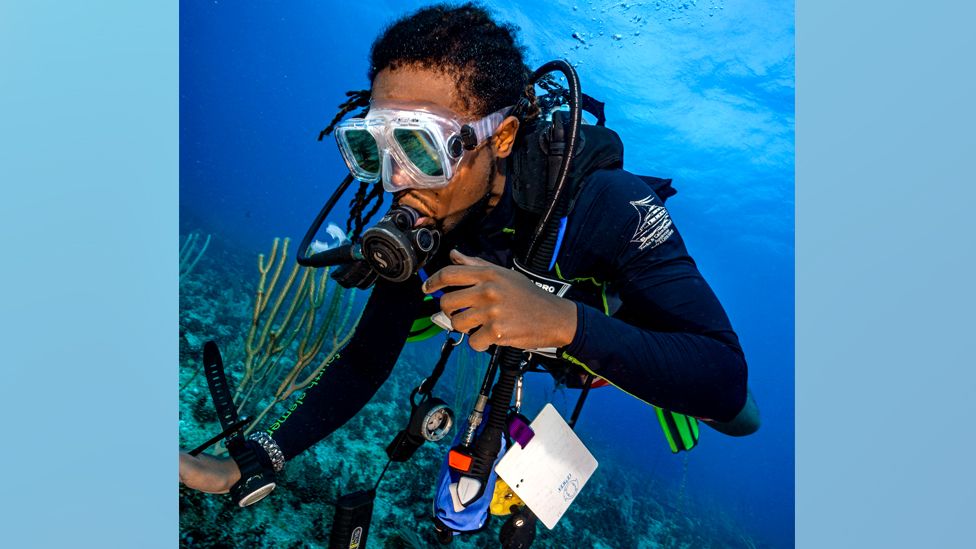-

-
-
Loading

Loading

Reginald Beckford used to have a fear of sharks and preferred to stay on dry land. However, his perspective changed when he discovered the beauty beneath the ocean's surface. Now, he works as a scuba diving instructor and plays a crucial role in protecting the third-largest barrier reef in the world. Reginald is part of a dedicated team of reef protectors in the Turks and Caicos Islands. In 2019, the islands became the seventh Caribbean country to be affected by stony coral tissue loss disease (SCTLD), which is the deadliest coral sickness ever recorded. This disease has rapidly spread across the region, impacting reefs in 28 nations. Reginald's journey into scuba diving started when he worked as a night watchman on a dive boat. His first dive was a surreal experience, and it ignited his desire to preserve the underwater world. Unfortunately, the disease has impacted every part of the Turks and Caicos Islands' reef, raising concerns for the environment and the livelihoods of those dependent on it. As a certified dive instructor, Reginald has trained over 100 students and contributed to the efforts to combat SCTLD. These efforts are led by the TC Reef Fund, an NGO mostly run by volunteers, in collaboration with the government's environment department. The disease affects over 30 species of coral, often resulting in their death within weeks of infection. Reginald's work involves applying an antibiotic paste to sick corals, which has shown significant success in halting the spread. Reginald is not alone in his career change to fight against the disease. Arenthia Baker, a former teacher, moved to the Turks and Caicos Islands during the Covid-19 pandemic and is now a certified fish data scientist and divemaster. She volunteers with the Reef Fund and finds it immensely fulfilling to work in conservation. The reef's situation has worsened due to unusually warm seas, leading to widespread coral bleaching. Despite the challenges, Arenthia remains optimistic that they can overcome SCTLD. Researchers at the Smithsonian's National Museum of Natural History have made a significant breakthrough by discovering the first effective bacterial probiotic for treating the disease. This development is crucial, as the current use of antibiotics risks promoting antibiotic-resistant bacteria. Turks and Caicos Islands have become trailblazers in reef restoration research. They have established two in-water coral nurseries and a land-based biobank, which is the first of its kind in the Caribbean's British territories. The biobank, made possible by funding from the John Ellerman Foundation, aims to preserve genetic diversity by housing fragments of healthy coral. Creating the ideal conditions for the corals to thrive is a complex process involving synthetic seawater and feeding them various nutrients. The team's work is vital as the health of the world's oceans takes center stage at the UN climate summit. There is a fear that the disease could reach the Panama Canal and spread to the Pacific, which would be disastrous for reefs worldwide. The Reef Fund's office also serves as a visitor center, welcoming schoolchildren to inspire them to pursue careers in conservation. While Alizee Zimmermann, the executive director of the Reef Fund, remains hopeful about their restoration efforts, she acknowledges that the coral reefs of her childhood will never return. However, she is determined to protect and restore them for future generations.